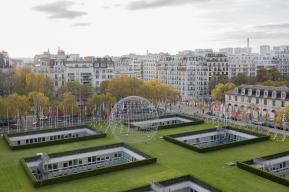News
Defending Critical Voices: Judiciary’s Role in Safeguarding Press Freedom in the face of Environmental Crisis

We know that the risks that journalists are taking in reporting on environmental issues are getting stronger and stronger. This situation must compel us to action. And for that, we need justice: we need judges and the police to protect free speech, a free press, and access to information on issues that are of an existential nature for humanity.

The event, organized as part of the World Press Freedom Day Conference by UNESCO with the Supreme Court of Justice of Chile, was hosted in its Hall of Honor.
UNESCO Director-General, Audrey Azoulay opened the event alongside the President of the Supreme Court Ricardo Luis Hernán Blanco Herrera.
Supported by the Multi-Donor Programme on Freedom of Expression and Safety of Journalists, the event featured high-level panelists and experts from diverse regions, notably Latin America and the Caribbean, where a significant number of journalists face threats while reporting on environmental issues.
Audrey Azoulay highlighted findings from UNESCO’s recent issue brief on the safety of environmental journalists, revealing alarming statistics of attacks of at least 749 journalists in 89 countries between 2009 and 2023. Of those 253 occurred in Latin America and the Caribbean.
Among those attacked, a total of 44 journalists reporting on environmental issues have been killed in 15 different countries, with 11 journalists killed in Latin American countries, accounting for 25% of the total killings.

The occurrence of acts of pressure and threats against investigative environmental journalism and, in general, against those who investigate and disseminate this type of information, is a risk that, with different intensities, is present in the (Latin American) region. […] The intervention of the courts of justice in the face of threats or persecution of those who exercise their freedom of the press in pursuit of environmental protection is an imperative that delivers a necessary message in any democratic society: institutional reproach to those who violate freedom of the press.
The event served as a platform for sharing experiences and best practices aimed at enhancing the safety of journalists and environmental defenders, while strengthening the judiciary to prosecute crimes targeting them and championing press freedom amidst the environmental crisis.
Key recommendations emerged, emphasizing the interconnectedness of environmental crimes, freedom of expression and access to information. Participants stressed the need for a holistic approach involving all relevant stakeholders, including members of the judiciary, policymakers, legislators and media.
The establishment of specialized judicial network to foster knowledge sharing and international cooperation in investigating and prosecuting attacks against environmental defenders was also advocated.
Moreover, policymakers were urged to enact targeted legislation, including anti-SLAPP laws to counter legal harassment aimed at silencing critical voices reporting on environmental crimes.
Capacity-building and training programmes on international standards were deemed essential to equipe judicial actors with the necessary tools to protect journalists and environmental defenders effectively.
The UNESCO’s Judges Initiative launched in Latin America in 2013, has supported over 36,000 judicial actors across 160 countries. With continuous support from partners like the Inter-American Court on Human Rights and the International Association of Prosecutors, this initiative aims to enhance judicial systems in upholding freedom of expression, access to information, and journalist safety through regional trainings, Massive Open Online Courses (MOOCs) and publication of toolkits, guidelines and issues briefs.






